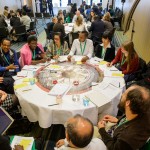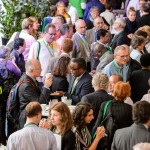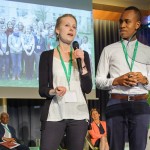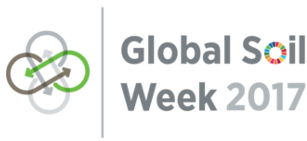Global Soil Week 2015: Soil. The Substance of Transformation.
Please read the programme description here.
Session information and outcomes
Find out about the content and outcomes of the individual sessions of the Global Soil Week 2015, which include the rapporteurs’ reports, session descriptions, 120 second summary videos and presentations given at the Global Soil Week, please click here.
 Global Soil Week 2015 report by the IISD
Global Soil Week 2015 report by the IISD
The third Global Soil Week convened in Berlin, Germany, from 19-23 April 2015 was on the theme “Soil. The Substance of Transformation.”. It brought together 600 scientists, policy makers and practitioners from 80 countries. The reporting service of the International Institute for Sustainable Development (IISD) documented the event and made available daily reports (for Monday 20th, Tuesday 21th, Wednesday 22th and Thursday 23th April 2015) as well as a comprehensive event report. Please download the report here. For the reports on the IISD website, please click here.
 Chairman’s Conclusions
Chairman’s Conclusions
This document presents the conclusions by the chairman of the Global Soil Week, Prof. Dr. Klaus Töpfer, Executive Director, Institute for Advanced Sustainability Studies (IASS), Potsdam. Please read the conclusions here.
 Plenaries
Plenaries
Watch all plenaries of the Global Soil Week 2015 here.
120 second session summaries

Session 1.7 + 2.5 - Economics of land degradation
Economics of land degradation – how to integrate economic arguments into decision making processes?
Land degradation is undermining global food security and negatively affecting the livelihoods of billions of people. The consequences of land degradation are substantial and far-reaching, from reduced crop and livestock productivity and production, to huge losses in the essential ecosystem services derived from land.

Session 2.2 - Sustaining our soils and societies: the challenge of doing transdisciplinary research
Soils and land resources are under threat. At the same time, the role in soils and land for climate change, biodiversity, food security and poverty reduction is increasingly acknowledged up in global political spheres, as evidenced by the current process to negotiate the Post-2015 Development Agenda. However, the way in which soil and land problems are addressed by society is often characterised by separating and fragmenting issues that should be addressed from a holistic perspective. In the efforts towards a more sustainable development, the concept of transdisciplinarity has gained importance and is now entering scientific, political, and economic spheres.

Session 2.6 - Soils and societal commitment: moving towards healthy soils
Both developed and developing countries are battling with a legacy of land contamination issues, often unknowingly. Even though contamination may be present, people remain on the land where they produce food and drink water, since they are either unaware of the contamination or cannot afford to move to healthier areas. While these issues may differ from country to country, the detection and monitoring of the extent of it are of utmost importance to human and environmental health. The session will illustrate the effect of soil pollution on human and environmental health in South Africa and the use of bio-indicators as an alternative, more affordable pollution detection method. It will then focus on the challenges and opportunities associated with gathering existing data and making it publicly available for decision-making in Belgium. A discussion will conclude the session on ideas for the way forward and the establishment of Soil Health Centres for monitoring and improving soil quality.

Session 2.8 - Vulnerable landscapes – vulnerable societies
Vulnerable landscapes – vulnerable societies: the role of grass and grazing livestock in building resilience to climate change
Soil degradation is a global problem affecting rangeland and cropland alike. Up to two billion people directly depend on grazing livestock for their food security and livelihood in drylands. Vulnerable landscapes equal vulnerable societies, not just in the Global South but also in developed countries with temperate climates. Pastoralism and mixed crop and livestock farming are in decline. Yet grazing livestock and an understanding of soil biological life hold the key to rebuilding soil fertility, productivity and resilience into the distant future.

Session 3.1 - Three years of VGGT – experiences and strategies for implementation and monitoring
There is now an international consensus and agreed normative standard for what responsible, human rights-based land governance should look like – the Voluntary Guidelines on the Responsible Governance of Tenure of Land, Fisheries and Forests in the Context of National Food Security (VGGT). The strength of these guidelines rests not only on the unanimous adoption by the Committee on World Food Security (CFS), but also on the unique and inclusive process that preceded the negotiations.

Session 3.2 - Tools and approaches to increasing supply-chain sustainability of land-based commodities
Tools and approaches to increasing supply-chain sustainability of land-based commodities: what works on paper and what works in practice?
Identifying and exploiting leverage points to improve the sustainability of the international trade in these commodities is one of the most critical sustainable development challenges we face in the twenty-first century. Given the complex geographies, teleconnections and interdependencies that define contemporary global trade, this is no easy task.

Session 3.3 - Soil and land indicators for the international policy agenda: towards joint action
Land and soil issues are key elements in achieving several of the proposed Sustainable Development Goals (SDG), such as food security, and protecting biodiversity and climate. Particularly, the issue of land degradation requires substantiation in term of definition and indicators. For this it is crucial to provide input into existing and new initiatives to assess the status and trends of global land and soil degradation.
![Session 3.4 - Building a knowledge and innovation platform [...]](https://i.vimeocdn.com/video/519052853_640.jpg)
Session 3.4 - Building a knowledge and innovation platform [...]
Building a knowledge and innovation platform on diffuse and point soil contamination as a base for (inter)national soil policies
The objective of this session is to exchange on soil contamination caused by point and diffuse pollution as a mean to contribute to the “Zero net Land degradation” sustainable development goal for Rio+20″, including food security for the year 2030.

Session 3.6 - Soil fertility management – towards a joint paradigm
Ensuring sustainable soil-fertility management practices is one of the major challenges of the twenty-first century. Such practices will be necessary to feed a growing population and maintain life-supporting ecosystem services for all. Soils are being degraded on a large scale and at an alarmingly fast rate; soil fertility is declining and the pressure on this resource is increasing. We need a shift towards sustainable farming concepts that can be applied without degrading the natural resources (soils, land and water) on which our agricultural production and ecosystems depend.

Session 3.7 - Nexus governance Post-2015: towards collaborative implementation
To provide a “safe and just space for humanity”, we need to move beyond governance con-cepts emphasizing efficiency under the assumption that resources can keep up with growing demands. Furthermore, we need to strengthen governance mechanisms that account for the complex interdependencies which constitute the social-ecological systems on which we rely on. Current attempts for sustainability governance, such as the ongoing process to set universal Sustainable Development Goals (SDGs), tend to neglect these interdependencies. In the course of implementation, this neglect could lead to increased resource competition or even conflicts. The nexus heuristic offers ways to address these interdependencies. This session explores current experiences on working with the nexus heuristic across disciplines. To do so, we open the floor to a diversity of lessons learned both from theory and practice as well as spanning across a range of themes including water management, soil conservation, food security and energy security. Based on this exchange of expertise the session will embark on a transdisci-plinary consultation on how our participants’ experiences, ideas and concerns could feed into a collaborative effort vis-à-vis the challenges we are facing in the context of the Post-2015 Agenda.

Session 3.8 - Soil-atmosphere exchange
Soil-atmosphere exchange processes are one of the major uncertainties in the evaluation of future climate change. Soils release important greenhouse gases such as CO2, CH4 and N2O but they also have the biggest potential for carbon sequestration. In addition, soil-atmosphere exchanges of gases and particulates affect air quality and thus human health.

 Global Soil Week 2015 report by the IISD
Global Soil Week 2015 report by the IISD Chairman’s Conclusions
Chairman’s Conclusions Plenaries
Plenaries








![Session 3.4 - Building a knowledge and innovation platform [...]](https://i.vimeocdn.com/video/519052853_640.jpg)


